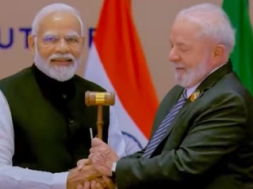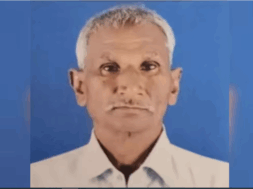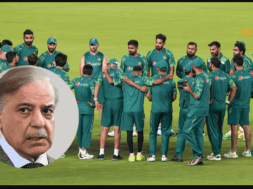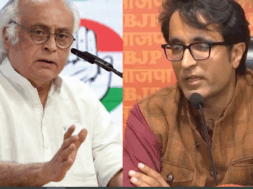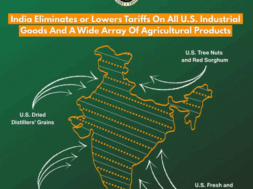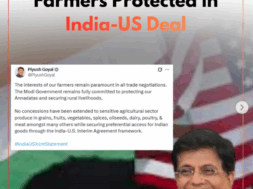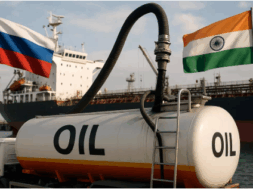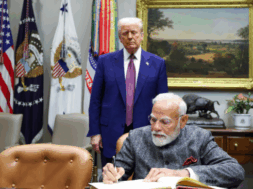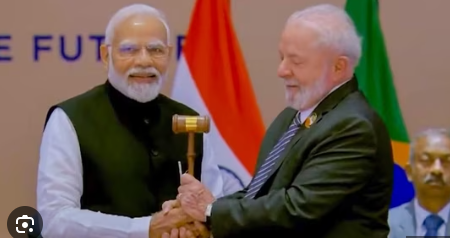
G20 Summit Closes with Suggestion to Hold “Virtual Summit” in November, Baton Passed on to Brazil
Manas Dasgupta
NEW DELHI, Sept 10: Passing on the G20 baton to Brazil for presidency for the next year, the Prime Minister Narendra Modi while declaring the Delhi Summit closed on Sunday proposed a “virtual summit” of the elitist group by the end of November to take stock of the progress made in the suggestions and decisions taken at the just-concluded summit in India.
Marking the ceremonial transfer of the G20 presidency, Prime Minister Narendra Modi handed over the gavel to Brazilian President Luiz Inacio Lula da Silva, who praised India for giving voice to topics of interests of emerging economies.
In his concluding remarks at the final session of the two-day G-20 summit in New Delhi, Modi pointed out that India’s presidency of G-20 would officially continue till November 30 and it would prefer to review the developments made in the remaining two-and-half months left for its tenure as the head of the grouping before Brazil took over on December 1.
“India has the responsibility of G20 presidency till November. In these two days, you (world leaders) have expressed several views and put forward various proposals. I propose that we hold a virtual session of G20 in November end, where we can review the subjects of this summit,” PM Modi said at the third and the concluding G20 session at Bharat Mandapam in New Delhi’s Pragati Maidan.
Speaking at the concluding session, Mr. Modi made a renewed push for expansion of the UN Security Council and reforms in all global institutions to reflect world’s “new realities”, as the G20 summit drew to a close with the U.S., Russia and France praising the meeting outcomes under Indian presidency.
Mr Modi said, “Yesterday, we had wide-ranging discussions in the ‘One Earth, One Family’ sessions. I am satisfied that today the G20 has become a platform for optimistic efforts regarding the vision of One Earth, One Family, One Future.”
Lula da Silva congratulated PM Modi, and listed social inclusion, the fight against hunger, energy transition and sustainable development as G20 priorities. He said the UN Security Council needs new developing countries as permanent, non-permanent members to regain political strength. “We want greater representation for emerging countries at the World Bank and the IMF,” he said.
The big takeaway of the Summit were a call to end the “global trust deficit”, the launch of the Global Biofuel Alliance, and the launch of new connectivity networks between the US, India, Saudi Arabia, and Gulf states.
The G20 members unanimously adopted the Delhi Declaration, which called on nations to uphold territorial integrity and international humanitarian law to safeguard peace and stability. “We call on all states to uphold the principles of international law including territorial integrity and sovereignty, international humanitarian law, and the multilateral system that safeguards peace and stability,” the declaration said.
It was an unexpected success for India making an early breakthrough in making all member countries agree to joint declaration forging consensus on the contentious “Ukraine paragraphs” on Saturday. The development was announced directly by Prime Minister Narendra Modi, who stopped proceedings during the second session of the Summit on day to announce the unanimity on the resolution.
China and Russia, whose heads of state skipped the Summit, were also in agreement with the Delhi declaration. But while the declaration called on all states to not use force to grab territory, it avoided condemning Russia for the war in Ukraine. Ukraine’s foreign ministry said the declaration was “nothing to be proud of” adding that a Ukrainian presence would have given participants a better understanding of the situation. Ukraine, however. Was not invited by host India to attend the Delhi Summit.
The G20 bloc also said they would aim to triple global renewable energy capacity by 2030 and expedite efforts to phase down coal power in line with national circumstances but did not commit to a phase-out of all polluting fossil fuels, including oil and gas. The bloc, which represents 85 per cent of the world’s GDP and contributes 80 per cent of emissions, however, said it would uphold its 2009 promise made in Pittsburgh to eliminate and rationalise inefficient fossil fuel subsidies.
Ahead of the concluding session on Sunday, the delegates visited and paid homage to Mahatma Gandhi at his memorial Rajghat in Delhi.
The leaders attending the summit included the US President Joe Biden, German Chancellor Olaf Scholz, French President Emmanuel Macron, British Prime Minister Rishi Sunak, Turkish President Recep Tayyip Erdoğan, Canadian Prime Minister Justin Trudeau, his Italian counterpart Giorgia Meloni, South Korean President Yoon Suk Yeol and Brazilian President Luiz Inácio Lula da Silva. The Chinese president Xi Jinping and the Russian president Vladimir Putin did not attend the Summit and the countries were represented by high level delegations.
Prime Minister Narendra Modi and French President Emmanuel Macron also held bilateral talks on the sidelines of the G-20 Summit. “Both leaders reiterated their commitment to strengthen the defence cooperation through partnership in design, development, testing and manufacture of advanced defence technologies and platforms, and expand production in India, including for third countries in Indo-Pacific,” a joint statement said.
“In this context, they also called for early finalisation of the Defence Industrial Roadmap,” it said. “They reiterated their unwavering commitment to collectively serve as a force of good, carrying the message of ‘Vasudhaiva Kutumbakam’ that is ‘one earth, one family, one future’, during tumultuous times reshaping the global order,” the statement said.
“Laying emphasis on areas such as digital, science, technological innovation, education, culture, health and environment cooperation, both leaders called for strengthening of institutional linkages in these domains, on the model of the Indo-French Campus for the Indo-Pacific,” it said.
